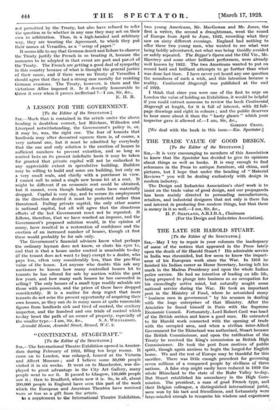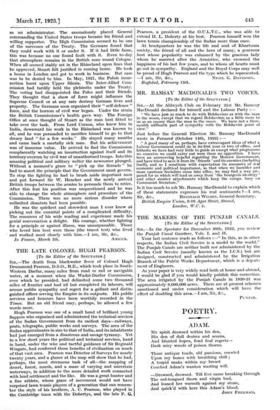THE LATE SIR HAROLD STUART.
[To the Editor of the SPECTATOR.]
Sin,—May I try to repair in your columns the inadequacy of some of the notices that appeared in the Press lately upon the death of Sir Harold Stuart ? His admirable service in India was chronicled, but few seem to know the import- ance of his European work since the War. In 1916 he finished his Indian career as Home Secretary, having left his mark in the Madras Presidency and upon the whole Indian police service. He had no intention of leading an idle life, being prepared to plunge into business as an occupation for his exceedingly active mind, but naturally sought some national service during the War. He took an important. post in the Ministry of Food, where he astonished many " business men in government " by his acumen in dealing with the huge enterprises of that Ministry. After the Armistice he found himself in Paris with the Supreme Economic Council. Fortunately, Lord Robert Cecil was. head of the British section and knew a good man. He entrusted to Sir Harold work connected with the opening of trade with the occupied area, and when a civilian inter-Allied Government for the Rhineland was authorized, Stuart became the British Commissioner, and upon the ratification of the Treaty he received the King's commission as British High Commissioner. He took the post from motives of public spirit, though again anxious to begin the longed-for English home. We and the rest of Europe may be thankful for this sacrifice. There was little enough precedent for governing seven millions of a conquered people by civilians of three nations. A false step might easily have reduced in 1919 the whole Rhineland to the state of the Ruhr Valley to-day. But Stuart established his ascendancy in the High Com- mission. The president, a man of good French type, and their Belgian colleague, a distinguished international jurist, were won by his tact and. friendliness, and fortunately were lame-minded enough to recognize his wisdom and experience
as an administrator. The anomalously placed General commanding the United States troops became his friend and willing supporter. The High Commission seemed to be one of the successes of the Treaty. The Germans found that they could work with it or under it. If it had little fame, this was because no one found fault with it. Even to-day that atmosphere remains in the British zone round Cologne. When all seemed stably set in the Rhineland upon lines that he approved, Stuart felt justified in coming home. He took a house in London and got to work in business. But case was to be denied to him. In May, 1921, the Polish insur- rection burst upon Upper Silesia. The Inter-Allied Com- mission had tardily held the plebiscite under the Treaty. The voting had disappointed the Poles and their friends. They thought that a show of force might influence the Supreme Council or at any rate destroy German lives and property. The Germans soon organized their " self-defence " force, and the horrors of civil war began. Under the strain the British Commissioner's health gave way. The Foreign Office at once thought of Stuart as the man best fitted to take over the task. From Lord Curzon, who knew him in India, downward his work in the Rhineland was known to all, and he was persuaded to sacrifice himself to go to that dreary land " for a few weeks." He stayed many months and came back a mortally sick man. But his achievement was of immense value. He arrived to find the Commission complacently watching an insurrection against itself and its territory overrun by civil war of unauthorized troops. Into this amazing political and military welter the newcomer plunged. Without a moment's grace to " pick up the threads " he had to assert the principle that the Government must govern. To stop the fighting he had to brush aside important men and put forward Sir W. Heneker and the newly arrived British troops between the armies to persuade them to retire. After this feat his position was unquestioned and he was able to change the whole atmosphere and procedure of the Commission. There was no more serious disorder where unlimited disasters had been possible.
He was the quickest and shrewdest man I ever knew at picking out the essential points of a complicated difficulty. The resources of his wide reading and experience made his genial conversation a delight. His courage, whether fighting for a principle or against illness, was unsurpassable. Those who loved him best were those (the truest test) who lived and worked most closely with him.—I am, Sir, &c.,











































 Previous page
Previous page